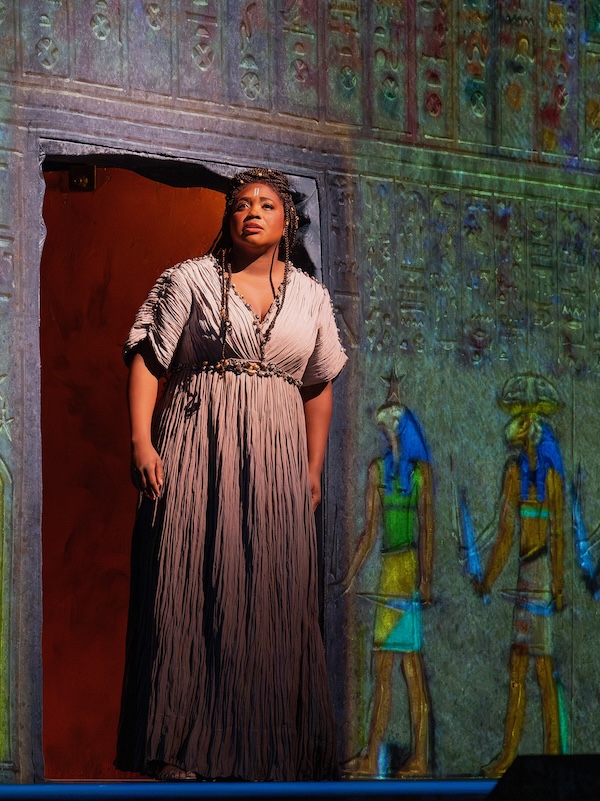Blue returns for final season run of Met’s “Aida”

The Metropolitan Opera’s new production of Aida returned Sunday afternoon for an end-of-season run. From the opening-night performance on New Year’s Eve the cast has gone through a few changes. These final performances mix singers from that opening night with several key new faces.
Soprano Angel Blue returns in the title role and music director Yannick-Nézet Séguin is back in the pit. Joining them were tenor Brian Jagde as Radamès and mezzo-soprano Elīna Garanača as Amneris. Baritone Amartuvshin Enkhbat replaces the original Amonasro, Quinn Kelsey.
In a notable way, it’s impossible to evaluate this cast against opening night, because Piotr Beczała, as Radamès, was recovering from illness and his singing was severely limited. He did make the questionable decision to tough it out all night, and it put a dent into the overall performance. Still, he, Blue, and Judit Kutasi as Amneris, had great chemistry, and Kutasi was vocally stellar and dramatically fiery in her role.
Blue was superb opening night and again Sunday, perhaps even better. The great arias “Ritorna vincitor” and especially “Qui Radamès verrá” were excellent. Her sound is full of substance and color, ideal for this role, and Sunday she seemed to take extra time and space to not just sing the notes but articulate the emotions and drama behind them. Her performance of the latter reached the feeling of time stopping.
Even with Blue, the new configuration doesn’t have quite that same chemistry on stage, though by default the singing is drastically better, though it took some time to jel. Jagde was typically strong, but maybe too energized in Act I, something of a hammer with every musical idea seeming like a nail, even if there was room for more nuance in phrasing and color. Garanča was surprisingly subdued and near-recessive in “Quale insolita gioia nel tuo sguardo,” with so little presence to her lower range that one wondered if the part ill-suited for her.
As often happens a switch was hit at intermission, because Act III was incandescent, with everyone in full voice, full of passion and expressive musicality. This was the Garanča one expects, not just elegant but on the verge of tearing apart the scenery with intensity. Jagde too was on a higher level, shaping the reach and dynamics of his phrases to get the depth out of the music.
Morris Robinson as Ramfis and Enkhbat each had a satisfying vocal presence, a nice edge to their sound, and clear characterizations. Nézet-Séguin led a fine performance, the orchestra going from sweetness to savagery, always sensitive to the singers.
Michael Mayer’s production continues to impress. Aida is not just a melodrama but a spectacle, Mayer gives the people what they want, with monumental sets, stylish costumes from Susan Hilferty, and imaginative choreography by Oleg Glushkov.
He wraps this all in an intelligent concept and social context, with archeologists discovering a tomb and its relics and reading the story of Aida that the singers then bring to life. In a knowing and sardonic historical touch, the triumphal march accompanies the archeologists cataloging and looting the tomb’s contents.
Aida continues through May 9. metopera.org